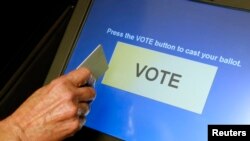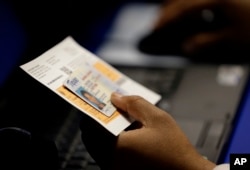An advisory commission set up by President Donald Trump to investigate voter fraud in the United States has not yet begun its work, but its very existence has taken to the extreme what was already a volatile, fiercely partisan debate.
The commission, comprised of 15 members, headed by Vice President Mike Pence, grew out of Trump’s assertion that “millions” of people voted illegally for his opponent in last year’s president election.
However no evidence has ever been presented to support the claim.
Election officials across the country, and even Trump’s own lawyers, say they do not believe that voter fraud on that scale occurred.
“All available evidence suggests the 2016 general election was not tainted by fraud or mistake,” said Donald Trump’s campaign counsel, Donald McGahn, who is now White House Counsel.
The issue, however, has been around for years, and many Republicans believe voter fraud is common enough, especially at the local level, to threaten the integrity of U.S. elections. In the Democrats' view, Republicans are exaggerating the problem to push for new laws that they say will, in effect, help Republicans at the polls.
A large number of Democrats have rejected Trump’s commission out of hand, saying there’s no way to separate the commission’s work from Trump’s unsubstantiated claim about illegal voters.
"A commission in search of a problem," is how Senator Amy Klobuchar, a Minnesota Democrat, described it this week. "This has been completely contrived from the start," said Senator Dick Durbin, an Illinois Democrat. The whole reason the commission exists, Durbin added, is so Trump's "hair-on-fire conspiracy theories" can be vindicated.
How big of a problem?
One commission member is Hans von Spakovsky, a veteran Republican lawyer who has long advocated tougher voting laws to combat what he says could potentially be massive cheating at the polls. Von Spakovsky told VOA he’s keeping an open mind.
"I have never once said [voter fraud] is widespread," said von Spakovsky. "What I have said is that it's a problem," and can make a difference in close elections, “particularly, at the local level, where races are often decided by a small number of votes.”
Von Spakovsky, who served in the George W. Bush administration, heads the Election Law Reform Initiative at the conservative Heritage Foundation, which maintains a Voter Fraud Database that tracks confirmed cases of voter fraud.
The database, which is not meant to be exhaustive, includes instances of voter fraud in federal, state and local elections across the country back to 1982. It has documented 581 confirmed cases of voter fraud.
Out of the billions of votes that have taken place since then, that number may seem quite small.
“But we think this is just the tip of the iceberg,” said Jason Snead, a Heritage policy analyst. “We believe there is considerably more fraud than what is in this database.”
Noncitizen voting
Specifically, van Spakovsky points to the issue of noncitizen voting that could go undetected, the same problem hinted at by Trump.
To back their claim, Trump officials have pointed to a 2014 paper by Old Dominion University researchers, who estimated the portion of noncitizens who voted in the 2008 election was 6.4 percent, or 1.2 million votes.
But that paper has been criticized by a wide range of experts, including the paper’s main author, who now acknowledges he probably overstated the amount of noncitizen voting because of a sampling issue.
“The claim Trump is making is not supported by our data,” said Old Dominion professor Jesse Richman in a blog post.
Dirty voter rolls
But there are vulnerabilities in the system. One of the main threats, according to conservatives, is inaccurate voter rolls.
A 2012 Pew study of state voter rolls found more than 24 million voter registration records were inaccurate, out of date or duplicates. About 1.8 million dead people were still listed as voters, and 2.75 million were registered in more than one state, the study found.
Inaccurate voter rolls make it easier for voter fraud to occur, but what isn’t known is the extent to which those vulnerabilities are exploited.
Many Democrats argue it doesn’t make sense that masses of people would risk jail time for a single extra vote (voting twice is a felony in most states). But Republicans say even just a vote or two could make a difference at the local level, and it wouldn’t hurt to clean up voter rolls and demand stricter voter ID laws.
Data request
At least 44 states have refused to fully cooperate with the commission, especially its request they hand over personal voter data, including voting history, criminal records and partial Social Security numbers, which the commission plans to release to the public.
The administration argues much of the requested voter data is already publicly available. But many states are concerned the commission’s plans to release the information will make it more easily accessible.
“I’m not sure what good it would do to have an incomplete database of some states’ voters out there with personal identifying information that could potentially be used for identity theft,” said Rick Hasen, a professor of law and political science at the University of California-Irvine and a prominent critic of the commission.
The data request has prompted multiple lawsuits. Earlier this week, the commission temporarily halted the request until the legal standoff is resolved. Nonetheless, von Spakovsky says the commission is determined to continue its work, and he dismisses opposition as politically motivated.
“I think it’s people who are just opposed to anything Trump is doing,” von Spakovsky said. “He raised a concern that many people have raised about the honor system that we have in registering and voting, and how easy it is to cheat that system. And I think that’s something we ought to explore. I think the president is actually right about that.”






